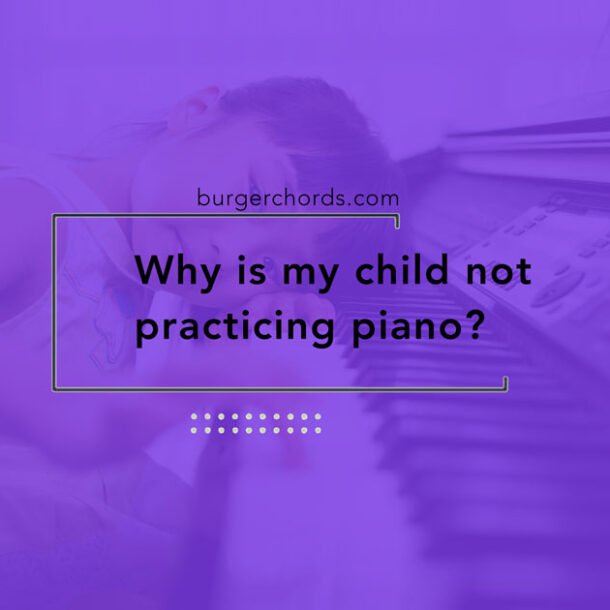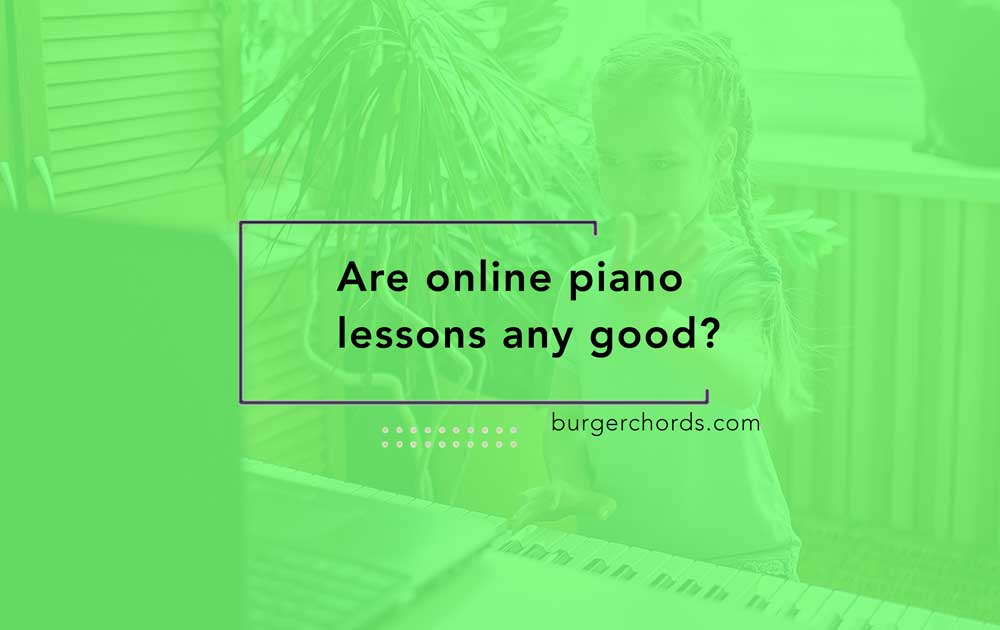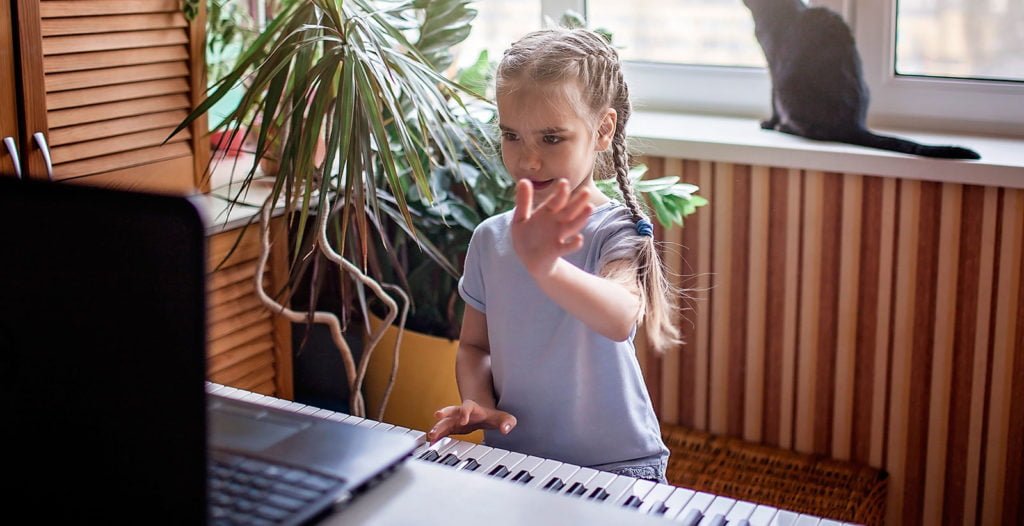

In the wilderness that is the Internets, there’s stacks of options for online piano lessons. However, with the abundance, there’s little quality control. Which begs the question, as a music education tool, are online piano lessons any good?
In this article, I’ll explain the various options available for piano lessons online. I’ll also share with you my experience of both learning and teaching piano online. Hopefully, this article can help you choose the path you’d like to take for your own piano adventures!
What types of piano lessons can I do online?
Online offers an incredible array of options for piano learning. Here’s a quick summary of what you can find online:
Virtual piano lessons
This is a face-to-face lesson with a piano teacher via a video call. Teachers often use Zoom or Skype.
PROS: Students don’t need to travel to the teacher’s studio to get private 1-on-1 piano lessons.
CONS: If you have a slow internet connection a Zoom lesson can get real tedious.

Piano lesson apps
Popular piano lesson apps include Flowkey, Yousician, and Skoove. Essentially, it turns piano playing into a game similar to Guitar Hero, where a player presses keys that follow a pattern of dots or lights appearing on the screen.
PROS: These apps are dead easy to get started on. They also offer HEAPS of music so students can easily find a song they like.
CONS: While it’s quick to get started, this method of learning requires a lot of patience! To learn a song, you essentially need to memorise the sequence of the notes — just like learning the right order and timing of buttons to press to pass a Guitar Hero level.
Self-guided methods
These are often membership websites like Playground Sessions or Hoffman Academy. They give you access to a database of piano courses, and you complete the lessons on your own time.
PROS: Self-guided piano lessons work well for intermediate learners, because you can access highly experienced players in a very affordable way.
CONS: This option requires a lot of self-learning and self-discipline, as you’re not only working through the lessons on your own, but also planning your own learning pathway.
Educational marketplace
These are membership platforms like Udemy that offer access to a huge database of short courses. They’re similar to self-guided methods, but are often created by many individuals rather than one teaching studio.
PROS: You’re not limited to one piano method, or one teacher, and your membership can access areas other than music.
CONS: There’s no ‘quality control’ since it’s an open platform, and I’ve found the courses to be hit-and-miss.
DIY Video Tutorials
There are countless hours of videos on YouTube! Videos are created by individuals around the world, and you can find tutorials on how to play almost anything.
PROS: I love this option! I frequently turn to YouTube for ideas, and I often suggest YouTube clips to my students too. How incredible that we get to see players and performances from all around the world, from our couch!
CONS: YouTube is a chaotic place. With kids, parents will need to think about supervision or parental controls of content. And for adults, it’s easy to digress and get stuck down an hours-long YouTube hole!
My experience learning piano online
The internet has opened the possibilities to learn from and connect with people all around the world! This is what I love the most about online learning! I love the randomness of YouTube and have drawn so many tidbits from other amazing creators.
The biggest gripe I have with online piano lessons is doing it in isolation. I found that whenever I had a question, it took a long time to find an answer. Even trivial questions like “did I download the right file?” was not as simple as just asking the teacher in class.
My advice with piano lessons online is: don’t try and tackle it all on your own. If you don’t have a real-time piano teacher to help answer your questions, you can join a Facebook or Whatsapp group with other students, or you can ask friends or family to jam with you weekly, or join a community or school ensemble or orchestra. That way, you can chat with others and clarify any questions you have. And I guarantee, you’ll encounter a lot of questions! Plus, you’ll have like-minded peers to motivate you to keep going!
My experience teaching piano online
With Burger Chords, I teach virtual 1-on-1 piano lessons. In my experience, I find that online teaching works well with kids 9 years and up, and adult learners. Online teaching requires a degree of independent learning, which is a great skill to hone via online lessons, but is quite difficult for younger kids.
The other difficulty is the lack of multi-sensory learning in an online space. For this reason, very young learners may not find online lessons engaging. Furthermore, online piano lessons strongly favours visual learners. This means that kinesthetic learners may find online piano lessons harder to grasp since there’s no tactile engagement. Auditory learners may do well with virtual 1-on-1 lessons, but can struggle with the “one-way” communication of apps and videos because there’s no immediate feedback or discussion.
Ready to try a piano lesson?
So…are online piano lessons any good?
Yes! Absolutely. The biggest win for online piano lessons is they’re easily accessible. If you can start the ball rolling with any of the online piano options I listed above, that’s a positive step!
Conclusion
Regardless of the medium, it’s important to remember that learning a musical instrument is an ongoing adventure. Therefore, I’m wary of apps that market themselves as a “fast-track” or “shortcut” to piano playing. Rather, it’s better to use these tools to increase your enjoyment, ease, or motivation to continue learning and playing regularly. For example, an app won’t make a tricky piece any easier, but it can provide backing tracks that you can play along with, which makes it more fun to play the same song over and over again. Regular playing is key! So any online piano lesson worth their salt should inspire you to play.

About the piano teacher
Michelle is a freelance pianist and piano teacher who aspires to make music fun and accessible for anyone who wants to play. She’s been playing and teaching piano to kids and adults for over a decade, and brings good vibes playing piano for weddings and events at Michelle Plays Piano.
Michelle also plays drums in post-punk and indie bands around Melbourne, and has written about bands for The Music and EARMILK. When she’s not obsessing over music, she’s probably thinking about food.



